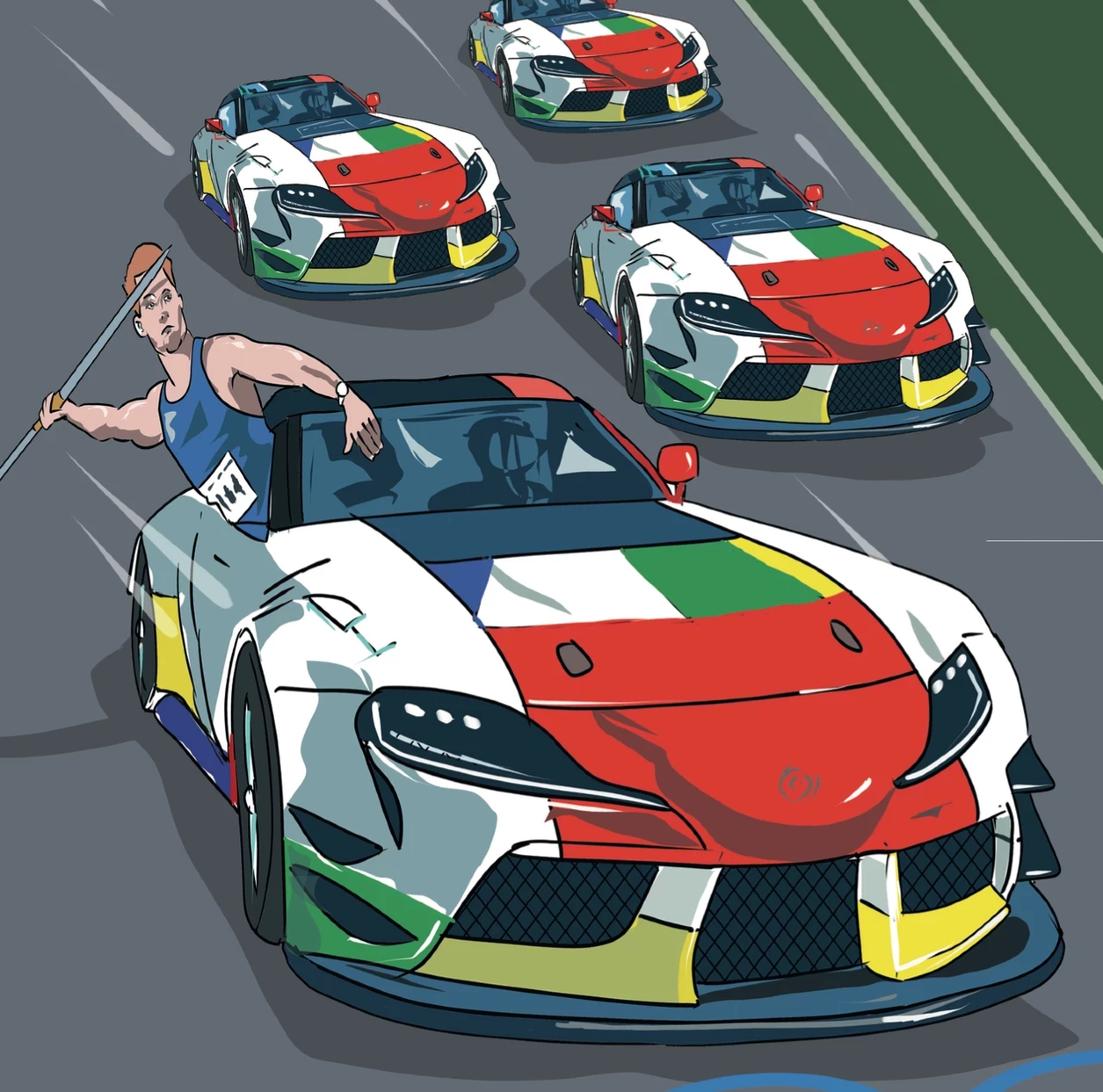The Wheels Of History
Should Motorsports Race Toward Olympic Glory?


IN THE PANTHEON of Olympic sports, pushed to the very limits of endurance, strength, and precision, one could be forgiven for overlooking the place of the automobile. Yet, delve into the dusty archives of Olympic history, and one might be surprised to find that car racing has already graced the Games—though, like many great revolutions, it was relegated to a footnote. Yes, motorsport, that high-octane spectacle of speed and technology, has flirted with Olympic glory three times: in 1900, 1936, and 1972. Each instance, though fleeting, offers a tantalizing glimpse into what might have been—and what still could be.
The Birth of Speed: 1900, Paris.
At the dawn of the 20th century, Paris was not just the City of Light but also the city of innovation, hosting the Exposition Universelle and showcasing the technological wonders of the age. Among them, the fledgling automobile. It was here, amidst the grandeur of the exposition, that 14 different automotive competitions were organized, inviting the world to witness cars of every stripe judged on endurance, fuel consumption, comfort, and ease of driving. There were no medals—this was, after all, a demonstration, not a sport—but prizes were awarded, and history was quietly made.
The victor? Alfred Velghe, speeding to triumph in his Mors, pocketing 8,000 French francs and sealing his place in the annals of early motorsport. But it was Louis Renault who triumphed in the voiturettes category, placing his newly conceived automobiles in the top three spots. The 4,000 French francs he earned were a mere bonus compared to the priceless marketing coup for his nascent company. It was a world on the brink of transformation, with the automobile poised to redefine human limits in the same way the Olympic Games had been redefined by the ideals of Pierre de Coubertin.
A Storm on the Horizon: 1936, Berlin.
Fast forward 36 years, and the world was a very different place. Hitler’s Berlin Olympics sought to cast the shadow of totalitarian grandeur over the Games, with the Führer using every opportunity to demonstrate the supposed superiority of Aryan athletes and German technology. But the 1936 automotive demonstration would not follow the script.
Modeled as a rally, with competitors traversing the newly built Autobahn before arriving in Berlin’s Olympic Stadium, it was a spectacle designed to underscore Germany’s engineering prowess. However, fate—or perhaps justice—had other plans. Betty Haig and Barbara Marshall, a British female team driving a Singer Le Mans 1500, crossed the finish line comfortably ahead of their nearest competitors. The victory of two women, driving a British car no less, reportedly so enraged Hitler that he had the finish line quietly moved to a deserted location away from the stadium. No medals were awarded, no headlines captured. But the story of Haig and Marshall endures as a victory of spirit over spectacle.
The Forgotten Race: 1972, Munich.
The last appearance of motorsport as a demonstration event came in the fateful Munich Games of 1972, where the sport’s moment was overshadowed by the tragedy of the Israeli athlete assassinations. Yet, 307 teams had embarked on a rally from Kiel to Munich, a race ultimately won by the famed Jean-Pierre Nicolas and Jean Todt in their Alpine A110 1800. It should have been a moment to celebrate—but the pall of terror that hung over the Games ensured that this victory, like the sport itself, was left largely unnoticed.
A curious footnote to this Olympic rally was BMW’s introduction of their 1602 Elektro-Antrieb—an electric car ahead of its time, with a battery range just sufficient to complete a marathon. In a world now enthralled by electric mobility, it is hard not to wonder if this small, largely forgotten contribution might have foreshadowed a very different future for both motorsport and the Olympic Games.
Racing for Gold: A Future Olympic Dream?
But what if, in our age of technological marvels and ever-expanding definitions of sport, motorsport were to finally secure a place on the Olympic stage? At first glance, the idea might seem discordant with the Games’ celebration of human physicality. After all, isn’t it the machine that wins the race rather than the driver? Yet, any motorsport aficionado knows better. A Formula 1 driver, for instance, can lose up to 5kg in body weight over the course of a single Grand Prix. The concentration, endurance, and physical strain are akin to that of any Olympic event. Perhaps the Games are finally ready for motorsport to take the podium.
One might imagine a new breed of Olympic racing, where sustainability and competition meet. Picture a monotype formula, with cars crafted from recycled and recyclable materials—where carmakers from across the globe submit their designs and the International Olympic Committee selects the blueprint for the next Olympic car. Perhaps a single model would be used for both sprint and endurance events, with limits placed on the number of repairs allowed, thus ensuring that it is not just speed but ingenuity and precision that determine the victor.
And just as Pierre de Coubertin, the founder of the modern Games, once said, “The most important thing in the Olympic Games is not to win but to take part,” so too might racing drivers, in the spirit of the Olympics, push the boundaries of human and technological endurance, with the goal not just of triumph but of participation in the ultimate competition of life.
A Golden Finish?
Motorsport at the Olympics may seem far-fetched today, but history has shown that the seemingly impossible can become reality. The same spirit that once led Louis Renault to drive his creations to victory, that allowed Betty Haig and Barbara Marshall to defy the odds, and that gave Jean Todt his moment of triumph may yet see car racing finally claim its rightful place at the Olympic Games.
For in the end, is the roar of an engine so different from the beat of a heart racing toward glory? Only time will tell if the Olympics are ready for such a shift—but the wheels, as they say, are already in motion.
The views and opinions expressed herein are the views and opinions of the author and do not necessarily reflect those of The Monegasque™.
Disclosure: The Monegasque™ enhances the editing process with the help of carefully selected AI tools. These tools provide valuable support without taking over the editing process completely, ensuring that the final product is the result of human creativity and expertise augmented by the benefits of enhanced technology. This article is protected under the copyright of The Monegasque™. Unauthorized reprinting, republishing, or rewriting of this content is strictly prohibited without explicit permission from The Monegasque™. Quotations from this material are permissible provided that a direct link to the full article on The Monegasque™ is included.